- Home
- Sebastian Faulks
Human Traces Page 52
Human Traces Read online
Page 52
Holzbauer turned his attention to the head, instructing the servant to take the block out from under the body and place it beneath the neck.
For the first time since Olivier had died, Jacques felt the desolation rise up in him. The prosector took a scalpel to begin the cut behind the left ear, and the annihilation of Olivier was suddenly too much for him to bear. He found himself back in the bedroom of his childhood, back in a broken past, with the mother he did not know, in a dark room with just his childish hope of what life might bring, his boy’s bravery and determination, where the only connection to the past he longed for, and to the future to which he would blindly burrow on, lay in the shape of his elder brother: Olivier alone had held the key, and Jacques could feel him now, ten years old, come to his younger brother’s bed, healthy and alive, and lying there next to him, shaking with laughter as they listened to the grown-ups downstairs, wrapping his arm round Jacques and holding him against his chest, where Jacques first noticed that special clean, sweet smell of his, so that the recollection of it as they took Olivier to pieces made him suddenly gasp with the appalling grief that came up like a wave in him – death, his own death too and the inevitable loss of all the vain hopes of life – howling and breaking in the darkness.
Thomas helped him from the room and took him upstairs to a bench in a gas-lit corridor, the seat where he himself had briefly sat while waiting for Herr Obmann to operate on Fräulein Katharina.
The two men sat side by side in the murky light, as once they had stood gazing from France at the English Channel; now they leaned forward, heads held in their hands in the silent moment of defeat.
‘Would you like to see your brother’s brain?’ said Franz Bernthaler three days later. ‘It has been well fixed in formalin and you might find it instructive.’
‘All right. I always said that I should like to see what it looks like, so I suppose I had better do so.’
Jacques followed Franz reluctantly to the cellar. Olivier’s brain was in a bucket of fluid on the workbench, from which Franz lifted it and held it beneath the electric light.
‘They are always a little smaller than one expects, are they not?’ he said. ‘So much of the skull area is taken up by the jaw, the eye socket and so on. Then the protection given by the skull restricts the brain space. Anyway, do you want to hold it?’
‘No.’
Looking at the organ, Jacques was thinking of Olivier’s astral diagrams and of the stable; but he was also thinking of the little boy who had once healthily been governed by this beige and silent piece of matter, from which had sprung inexplicable games and fancies and laughter.
‘Grossly visible,’ said Franz, ‘is a degree of cortical atrophy in the frontal and temporal lobes, here and here. I see a slight thinning of the surface brain tissue and a generalised shrinkage.’
‘Are these not normal post-mortem changes?’
‘No. And you see here, the sulci are slightly enlarged. The grey matter seems to ripple slightly more than normal because of the depth of the sulci.’
‘And how do you account for these changes?’
‘Rather mechanically,’ said Franz. ‘I suspect that we shall find that the ventricles are enlarged and that as they have pushed up and outwards, other things have had to make way.’
It did not seem enough, somehow, thought Jacques, as Franz took a large knife and made a sagittal cut, down through the centre of the two hemispheres. In section, Olivier’s brain had the look of a squashed boiled cauliflower, in which the grey matter replicated the shape of the rippled florets, and the white that of the solid inside of the vegetable below. In the heart of the white area was the opening of the ventricle.
‘I have the brain of a patient without mental illness for comparison,’ said Franz. ‘Even in gross appearance you can see the disparity in size in the openings here.’
Jacques nodded. It was true; though he could not see that an increased capacity for the generation of cerebro-spinal fluid told him much about the metaphysical enigma of his brother’s madness.
‘I shall now take some smaller sections to examine beneath the microscope,’ said Franz. ‘Would you like to stay and look?’
‘No, thank you. Tell me if you find anything unusual.’
‘Of course.’
‘And Franz.’
‘Yes.’
‘Do you normally incinerate the brains when you have finished with them?’
‘Yes.’
‘Do you think you might arrange with the priest to have it interred with his body in the graveyard?’
‘I will ask him.’
‘Thank you.’
Jacques was pleased to be back on the stone flags of the hallway; he felt the absurdity of the countless living functions his own brain performed each second without his even feeling them. You could not properly value such a thing; you could only laugh at it.
In the autumn, they began to move to the Wilhelmskogel. None of them gave voice to what they all felt: that Olivier’s death had blighted the place; that it had taken the joy from it. At a practical level, it had drawn their attention to how unsafe the situation was for lunatics, and new plans were drawn up to keep those most seriously unstable from having access to the drop. There was no alternative to the move, however; the lease on the Schloss Seeblick could not be extended and the stockholders in the railway company had legally protected expectations of the new venture.
Geissler’s transport system worked well, and throughout the summer large numbers of visitors were taken up on the railway and transferred into the cable-car for their ride to the top, where they were offered refreshments and directed on various walks. The local newspaper carried letters from one or two people complaining that their fellow-citizens had become lazy and instead of taking this new-fangled apparatus should be made to hike to the top of the mountain, but the populace thought otherwise and bought tickets in large numbers.
Jacques could not contemplate the move, in fact could concentrate on very little, tormented as he was by insomnia. He dragged himself through the days, dry-mouthed, dry-eyed, though he knew that his inability to sleep was the result of his mind trying to digest his loss, of the grief and the loneliness that he could not face by day.
When September came, Sonia organised the carriages to start moving furniture, while Thomas went twice weekly to the top of the mountain to oversee the final stage of the building works. The labourers had been discharged, back to Karfreit, and the plumbing, electrical works and decoration were in the hands of a building company from Villach. Hans had proved himself a worthy foreman, but was anxious to return to the schloss to see Daisy.
The only person truly enthusiastic for the relocation was Daniel, who was allowed to celebrate his fifth birthday in October by taking six friends from the village up to the summit to play hide-and-seek in the building site. A place was found for him in the village school near the foot of the mountain, beginning in the New Year, and the thought of travelling to and from school each day in a cable-car filled him with delight.
In December, Thomas received a letter from Hannes Regensburger, asking if he could pay a visit. His expedition to Africa had been delayed, he said, but he was more than ever certain that Thomas would benefit from accompanying him; he would not be leaving for another two years, so there would be time to make arrangements at home.
Regensburger was the last visitor to the old Schloss Seeblick, arriving a few days before Christmas. He took dinner with Thomas and Kitty in their apartment in the South Court.
‘I am proposing to steal your husband away, Frau Midwinter,’ he said.
‘So I understand. But I shall fight you for his company.’
‘If I promise to bring him back safely, would that make a difference?’
‘Certainly. I do not want him to be eaten by crocodiles.’
‘I give you my word. We would be travelling a well-beaten path in open country and in cool weather. Some of the German government guesthouses have running water and electric light.
’
Kitty handed Regensburger a dish of vegetables. ‘What concerns me more,’ she said, ‘is what possible use an English mad-doctor could be to a cartographical expedition. Are you all expecting to go insane?’
Regensburger gave a deep laugh. ‘No – though in fact it has been known to happen. No. I was impressed by your husband when we met. It is really as simple as that. Of course, it is a good idea to have a doctor in a large party and I am presuming he has not forgotten the elementary skills – cuts and stings and bruises and so forth. I understand that he is also a good photographer, which is not a claim I could make either for myself or for Lukas, my assistant. But we have managed the pictures before and we could do so again.’
‘So, what is it about Thomas?’ said Kitty.
‘It is a question of spirit,’ said Regensburger after a pause in which he drank from his wineglass. ‘There are one or two archaeological questions on which I have been doing some preliminary work at the university. These concern the dating of fossil remains. While I shall continue to be responsible for the homework, I know that your husband will share my intellectual interest and that he is a keen amateur of Darwin. But it is more even than that. Africa is a large country and it calls for a large response. When one sits by the campfire at night, it is better to be in the company of a man who has risen to the occasion. I feel confident that your husband is such a man.’
‘And your assistant, Lukas?’
‘He is a very good cartographer.’
‘I see. Well . . . I think I do.’
‘I have been to see Oscar Baumann twice more and have talked to him about the archaeological sites he found. Although he was not personally interested, he did make maps and keep a good diary so I think that we should be able to locate one or two of them.’
‘And how long would you take my husband for?’
‘I shall be away for more than a year, but I have worked out a different itinerary for him that would have him safely back to you in three months.’
‘Do you think he is strong enough for such an undertaking?’
‘I believe he is stronger than I am. Look at him. Hardly a grey hair. No excess weight. You see, my dear Frau Midwinter, there is a fine adventuring tradition among British doctors. They have always been mountaineers and explorers. All I ask of your husband is to sit on a mule, take the occasional photograph and keep me company.’
‘We will think about it,’ said Thomas. ‘There is presumably no hurry to decide.’
‘Indeed not,’ said Regensburger. ‘You have at least a year to settle into your new home before I start to look elsewhere for my companion.’
As the builders neared the end of their task, Sonia inspected the main house on theWilhelmskogel and marked out which rooms might be used for what. Frau Egger had already visited, somewhat apprehensive of the machinery that whisked her up, and given her approval to an enlarged kitchen, while Jacques andThomas had chosen their consulting rooms. Neither family would live in the main house, it was decided, which was to be given over entirely to the patients and their welfare. The Rebières and the Midwinters had a small house each, a minute’s walk apart, both with a fine view of the valley.
At the age of forty-two, Sonia felt she had it in her to make only one more family home and hoped that this would be the last. She sighed at the prospect of more builders, leaking roofs, upheaval, unsatisfactory finishes; nevertheless, as she walked through her new house, assigned a room to Daniel, selected in her mind the curtains she had seen for it in the draper behind the church in town, it was hard not to admit a small quickening of pleasure, like an old war horse, she thought ruefully, roused one last time by the sound of the trumpet.
XVIII
THE WORLD LOOKED beautiful to Daniel Rebière. Every morning his mother came to dress him in front of the fire in his room. He could dress himself, but liked the fuss she made of him, stealing kisses when she buttoned up his woollen jacket, calling him odd names and telling him how much she loved him, squeezing his ribs till they hurt. There was no one but them, and although he never thought as much, he had the joy of sensing that she was quietly obsessed by him.
After porridge, bacon, white rolls and hot chocolate, he was packed off in the cable-car with either his mother or Daisy or Hans to accompany him to the school in the village where the railway spur ended. His best friend in the class was a boy called Freddy, and when they had not seen each other for a while, they trembled with excitement. Not wanting to embrace, they hammered one another on the shoulders with their fists. Sometimes Freddy was allowed to come home with Daniel and stay the night in the spare bed in his room, where they lay whispering into the small hours.
Daniel’s father always came upstairs to say goodnight; he read to him and stroked his hair. He taught him French songs and sometimes spoke to him in French, though Daniel resisted it, since speaking German at school and English at home was work enough. His father was always kind to him, never raised his voice, but he was a little frightening.
Daisy was ridiculously kind, even more indulgent than his mother, feeding him chocolates and desserts left over from the patients’ dinner. Hans called him ‘Little Soldier’, though Daniel did not know why, and gave him rides round the top of the mountain on the pony.
Then there were his cousins. He was fascinated that there could be two identical girls. One minute he might be helping Charlotte in her red woollen dress to set out some dolls at the tea table in her nursery – not a task he relished, but stuck at for the sake of looking at her. The next minute he would be pulling Martha, in her green woollen dress, on a wooden cart. But she was essentially Charlotte. There was no difference – and he should know: he had studied them extensively. He discussed the matter tirelessly with his mother. ‘I think maybe Charlotte is a bit more boyish, Mummy.’ ‘Do you, darling? In what way?’He pondered deeply. ‘Hmm. I don’t know,’ he said mysteriously.
He was one and a half years older than the girls, and understood it was his duty to be kind to them, to encourage them in their childish games. When they reached the age of three in February, they were old enough to play satisfactorily together; so Daniel could sit on the floor, no longer needed, and just indulge himself by watching them, and laugh and laugh inside at this preposterous thing: these pretty girls with blonde hair and brown eyes, so snugly dressed, so individual, so unlike any of the girls at school, yet doubled. He loved them each, but liked them especially for being two.
‘You are a spoilt little boy, aren’t you?’ said his mother, when she put him into his pyjamas. ‘All these people fawning on you.’
‘Who is falling on me?’
‘Not falling, you silly boy, fawning. Doting.’
The other person he particularly liked was his aunt Kitty. Unlike the other grown-ups, she talked to him rather seriously, as though he were himself an adult; he felt thrilled by her confidence and tried to be worthy of it. He was invited to have a picnic lunch with her on his own one day, and took a sandwich in a box from his own mother’s kitchen. Kitty found him a chair in her main room and prepared a picnic for herself; she poured them both some apple juice, then sat down and asked him for his opinion of their new home, listening to him carefully over the top of her reading glasses.
Daniel’s brows came close together as he pondered his answer, but he was delayed by his sandwich of butter and cheese, which he was finding irresistible. He didn’t really want to talk; he just liked being with Aunt Kitty. He liked looking at her, in the same way that he liked looking at her daughters.
He finished too soon, but Kitty pretended she had also finished and went to fetch some fruit tarts from the kitchen. She played songs to him on a gramophone that her mother had sent from Vienna, the needle thumping and hissing through the brilliant black grooves as it conjured pictures of a band, a ballroom, men and women dancing in smart clothes and a world awaiting him.
He noticed that she was looking sad.
Kitty smiled. ‘I was just remembering. The songs remind me of when I wa
s sixteen or so. Not an old lady, as I am now.’
‘But you are not old.’ Daniel was appalled.
‘No,’ said Kitty. ‘You are quite right. I am not that old.’
‘You are pretty.’
‘And you are a flatterer. Have another tart.’
Daniel’s room had a sleigh bed and a long view towards the Karawanken and the Carnian Alps, and the white tops of the distant mountains were the last things he saw at night before his mother pulled the curtains. His toys lived in boxes arranged beneath the big window. He liked soldiers, though there was one that had always repelled him: a clockwork drummer with an alarm bell that went off in its head. He tried to interest Charlotte in swapping it for a knitted monkey he had coveted, but she hysterically refused.
Having all his life been surrounded by lunatics, Daniel thought nothing of the oddity of their behaviour. Some of them befriended him, as though they sensed in him a fellow-oddball, this only child wandering over the great mountaintop retreat with his wicker basket of toys digging into his arm, his head for ever cocked to one side in curiosity: wide-eyed, but not to be taken lightly; quietly spoken, but clearly possessed of will and determination, not someone they would trifle with.
When he was six, he was taught at school about Saint Valentine and, under the mistress’s instruction, made a coloured card for his love. He drew on it a picture of flowers in a bunch, and inside, again with the teacher’s help, wrote: ‘Dear Mummy, Be My Valentine, Love?’
He watched intently as Sonia opened it that evening and feigned amazement, delight, then utter bafflement as to the identity of her admirer.
‘Have you any idea who it might be, Daniel?’

 Devil May Care
Devil May Care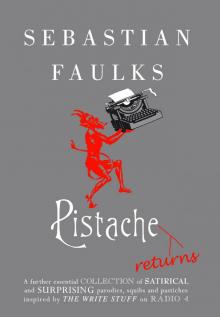 Pistache Returns
Pistache Returns The Girl at the Lion D'Or
The Girl at the Lion D'Or Pistache
Pistache Jeeves and the Wedding Bells
Jeeves and the Wedding Bells A Week in December
A Week in December The Vintage Book of War Stories
The Vintage Book of War Stories Engleby
Engleby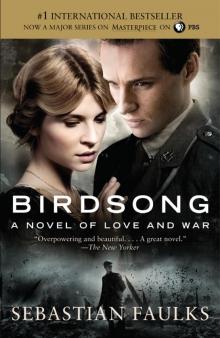 Birdsong
Birdsong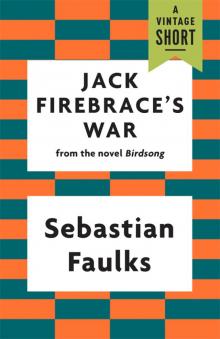 Jack Firebrace's War
Jack Firebrace's War Where My Heart Used to Beat
Where My Heart Used to Beat A Possible Life
A Possible Life The Fatal Englishman: Three Short Lives
The Fatal Englishman: Three Short Lives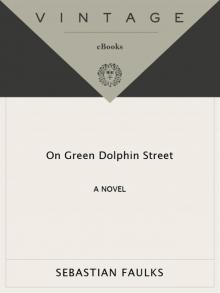 On Green Dolphin Street
On Green Dolphin Street Charlotte Gray
Charlotte Gray A Broken World: Letters, Diaries and Memories of the Great War
A Broken World: Letters, Diaries and Memories of the Great War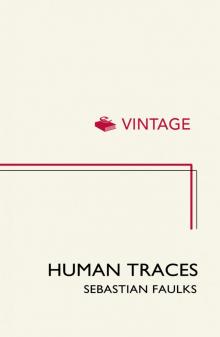 Human Traces
Human Traces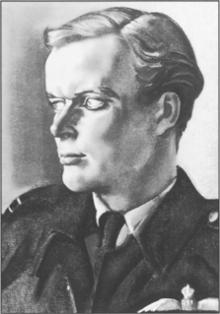 The Fatal Englishman
The Fatal Englishman A Broken World
A Broken World Paris Echo
Paris Echo War Stories
War Stories Girl At the Lion d'Or
Girl At the Lion d'Or